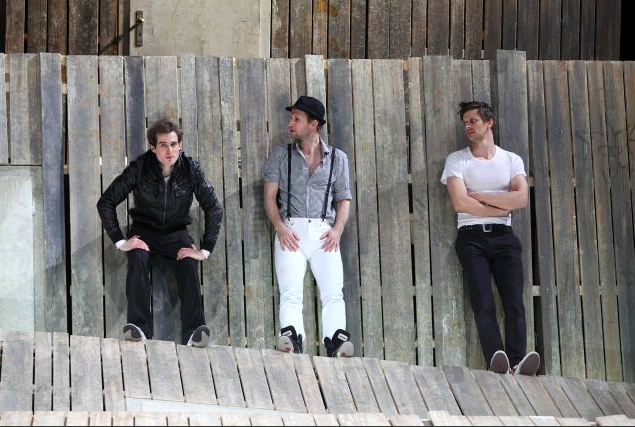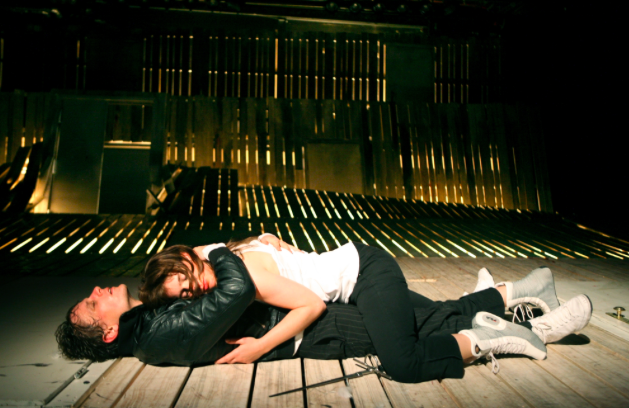Romeo and Juliet at the Schauspiel Frankfurt (Shakespeare / Bettina Bruinier)
My second Romeo and Juliet in Germany this year, and a much more satisfying production than Lars Eidinger’s at the Schaubuehne, which I saw in May. That’s not to say that the two productions were worlds apart: in fact, they approached the play in broadly similar ways (and Bettina Bruinier’s version premiered three years ago, so if it blazed a trail, Eidinger was merely plodding along in her footsteps).
Needless to say, the production is in modern dress; equally needless to say, it’s staged on a non-naturalistic set; and also needless to say, its young characters are actually played by young actors — in Romeo’s case, an actor out of theatre school for two years (Benedikt Greiner), in Juliet’s, about five years when the production was first mounted (Sandra Gerling). I suppose it’s also a little predictable that live music is performed on stage, though in a fairly low-fi mode: Romeo, Benvolio, and Mercutio all mess about on acoustic guitars at various points, handing them off to audience members in the front row at one point to get their hands free for a fight.
Stylistically, although this wasn’t a Berlin show, what was happening on stage felt very much like the kind of performance I saw in Berlin in May: the same theatricality, the same playfulness, the same willingness to engage with the space and its possibilities at the expense of any commitment to psychological or gestural naturalism, the same ability to be in the moment and respond to whatever happens onstage or off (at one point a loud sneeze in the audience prompted a “Gesundheit” from Juliet; Mercutio told a couple of latecomers to take the remaining empty seats in the front row; etc.). The general sense of actorly freedom extended (as in many of the other productions I’ve seen) to the text — in one of the most charming and captivating moments of the night, Juliet takes Romeo’s “give me my sin again” and keeps running with it, demanding kiss after kiss in an endless game of sinning and absolution that restarts every time it seems like she’s finally torn herself away. And while Bruinier retains far more of the big speeches than Eidinger (thankfully), she’s also not afraid to reshuffle the play: the show starts with Mercutio and Benvolio complaining about Romeo’s lovesickness in dialogue assembled from elsewhere in Act 1, then recasts the opening fight as a scuffle between Mercutio, Benvolio, Tybalt, and Old Capulet, turns the first scene between Lady Capulet, the Nurse, and Juliet as well as the Queen Mab speech into vignettes at the ball, and so on.
Tybalt and Juliet get something like a backstory (at one point during the ball, he gives her a pair of earrings), and the conflict between the Montagues and Capulets at times feels a bit like the conflict between Romeo and his friends on the one hand and Tybalt on the other. The production certainly seems to have cast Tybalt as the persistent source of violence in the play (by no means an unfaithful reading of the text), pitting him against Mercutio as the embodiment of a verbalized sex drive: after his death, he sticks around, with a blood-smeared face, leaving daggers in dangerous places and handing Romeo the vial of poison (there is no Apothecary). But even before that, it’s his brute force that transforms the playing space into the landscape in which Romeo and Juliet’s love develops. For the first third of the play, the set is a wide, flat wall of slats with two doors, close to the edge of the stage. People keep appearing and disappearing through those doors, French-farce-like, especially during the ball — until Tybalt, having been denied the right to attack Romeo, takes his anger out on the wall and pushes it over, revealing an entire stage full of toppled slat walls, their doors becoming trap doors and balcony doors on the receding and rising set. And he also reveals Romeo and Juliet centre stage, standing still, waiting for the wall to fall and their light before they launch into their shared sonnet, and the huge charm offensive I’ve already described.
Remarkably, although this Romeo and Juliet used the same translation as the Schaubuehne’s, the late Thomas Brasch’s version, which I found rather annoying and needlessly rhyme-heavy in Berlin, here seemed much lighter on its feet, switching effortlessly between the bawdy of the boys’ dialogue — with lots of room for improvisation (or what felt like improvised lines) and indulgent wordplay — and the artifice of Romeo and Juliet’s poetry. Unlike in Eidinger’s production, nothing felt forced here: the jokes weren’t hammered home, no bad puns were oversold as hysterical witticisms (lame jokes were allowed to remain lame, or else cut), no-one illustrated obscure lines. I don’t know who to thank for that: the actors, the director, the dramaturge, or all of them. But the evening served as a handy illustration that a text that seems leaden and uninspired in one production can easily spring to life in another.
It may be odd to focus on the quality of the jokes, given that Romeo and Juliet is not, after all, a comedy. But Bruinier’s R&J has that in common with the Schaubuehne’s: it refuses to take the play especially seriously. Mercutio becomes an undisputed centre of attention here, and until his death, most of what we see on stage is either hilarious or deeply charming — the balcony scene has Romeo and Juliet climbing and hurling themselves all over the many-layered set, with door-tricks aplenty. Friar Lawrence has moments of gravity, but they’re not really allowed any traction. The prince is barely there, delivering his verdicts from the edges of the auditorium (standing in the enormously tall doorways leading into the theatre — a position that feels both ceremonial and distant). And like Eidinger’s production, that insistence on the quasi-comedic logic of the play up to Tybalt’s death leaves the last third feeling a little devoid of drive: it’s possible, of course, to switch from funny to devastating, but if charming infatuation takes the place of raw desire, the grounds on which that switch could take place become awfully shifty. In Frankfurt at least Old Capulet is nasty enough to make his attacks on his daughter feel sufficiently savage; Juliet’s nightmare vision of waking up in the tomb is nicely handled; and Romeo is enough of a hysteric — and gets to play out that hysteria in his reaction to the banishment verdict — to make his suicidal mission appear plausible enough as a plot twist. But at the same time it’s quite clear that Bruinier only gives somewhat more of a toot about the final act than Eidinger: both directors evidently can’t quite take seriously the notion that either of these teenagers would kill themselves for love — or that we ought to find such a decision anything but a little ludicrous. Bruinier’s closing scene is both deliberately slapdash (Paris and Romeo’s dialogue is cut altogether, but Romeo still kills him, knifing him almost in passing) and kind of inspired, in a stripped-down way: there is no tomb; Juliet just lies on the stage floor. Romeo kneels beside her and drinks the poison; right away, Juliet’s eyes open — she’s facing us, so he can’t see her. And as she begins to move, he collapses — as she rises, he falls, and it is the thud of his body hitting the stage that makes her realize what has happened. It’s a beautifully staged moment, but that’s all it is: the production resolutely refuses to milk the scene’s emotional potential (almost all of Romeo and Juliet’s lines are gone, too).
None of this may be especially “true” to Shakespeare — or maybe it is. Personally, I’ve never been able to see Romeo and Juliet as anything other than selfish brats with a disturbing tendency to imagine each other’s deaths. So any production that undercuts the tragic qualities of the play and emphasizes the silliness of it all has my sympathy. There’s no doubt that Bruinier and her actors get the bawdy right (I overheard a satisfyingly large number of audience members upset about the dirtiness of the language after the show). And unlike Eidinger’s, the Frankfurt version seemed to have a fairly clear conceptual thought at its core: that Romeo and Juliet end up acting out an ill-conceived dialectic in which their dead bodies become the synthesis of Mercutio’s vision of life as sex and Tybalt’s of life as violence. In that sense, the production, for all its skepticism and irony, still takes the play seriously, even if it can’t do the same with its central characters. And perhaps that’s not an altogether inept reading of the text: that what feels like a tragedy for Romeo and Juliet is really just a bit of a sad — and kind of wickedly funny — mess from an outsider’s point of view.
(Much more to say about the use of space, and music, and lights, and stage fights, and about audience reactions — a crowd full of high school students who sat in rapt attention for over two hours!. But no time. And too many words already spilled.)
- Click to email a link to a friend (Opens in new window)
- Click to print (Opens in new window)
- Click to share on Facebook (Opens in new window)
- Click to share on Twitter (Opens in new window)
- Click to share on Tumblr (Opens in new window)
- Click to share on LinkedIn (Opens in new window)
- Click to share on Reddit (Opens in new window)
- Click to share on Pinterest (Opens in new window)
Recent Comments
- Premodern Performance-based Research: A Partial Bibliography – Alabama Shakespeare Project on My Trouble with Practice-as-Research
- Premodern Performance-based Research: A Partial Bibliography – Alabama Shakespeare Project on Where is the Theatre in Original Practice?
- Alex on Steven Moffat, Sherlock, and Neo-Victorian Sexism
- Tim Keenan on Where is the Theatre in Original Practice?
- Holger Syme on 1920s Berlin Theatre: Research Marginalia 1
Archives
- November 2021
- April 2020
- March 2020
- October 2019
- January 2019
- December 2018
- November 2018
- October 2018
- March 2018
- February 2018
- January 2018
- July 2017
- May 2017
- March 2017
- November 2016
- October 2016
- September 2016
- August 2016
- June 2016
- May 2016
- January 2016
- December 2015
- November 2015
- October 2015
- September 2015
- August 2015
- July 2015
- June 2015
- May 2015
- February 2015
- January 2015
- November 2014
- October 2014
- September 2014
- August 2014
- July 2014
- May 2014
- April 2014
- March 2014
- February 2014
- January 2014
- November 2013
- October 2013
- September 2013
- August 2013
- July 2013
- May 2013
- April 2013
- March 2013
- January 2013
- December 2012
- November 2012
- October 2012
- September 2012
- August 2012
- July 2012
- April 2012
- March 2012
- February 2012
- January 2012
- December 2011
- November 2011
- October 2011
- September 2011
- August 2011
- July 2011
- June 2011
- May 2011
Copyright

Holger Syme's work is licensed under a Creative Commons Attribution-NonCommercial 3.0 Unported License.Images may be reused as long as their source is properly attributed in accordance with the Creative Commons License detailed above. Many of the photos here were taken at the Folger Shakespeare Library; please consult their policy on digital images as well.



